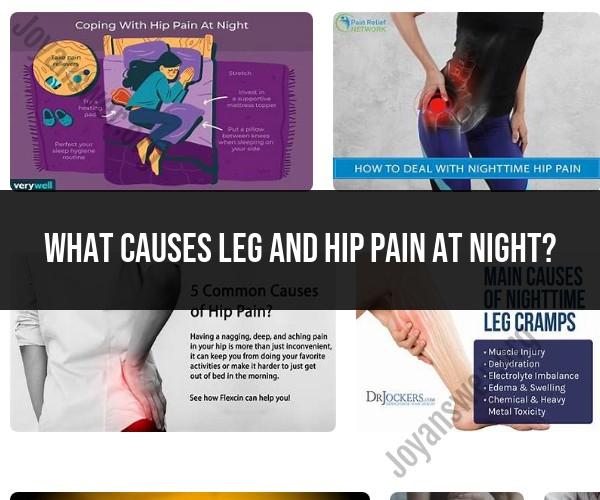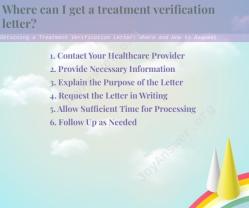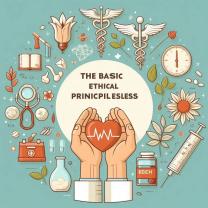What causes leg and hip pain at night?
Leg and hip pain at night can be caused by a variety of factors, including medical conditions, lifestyle factors, and injuries. It's important to identify the underlying cause of your pain in order to determine the most appropriate treatment. Here are some common causes of leg and hip pain at night:
Muscle Cramps: Leg and hip cramps, often referred to as "charley horses," can cause sudden, severe pain. These cramps can be due to muscle fatigue, dehydration, or an imbalance in electrolytes. Stretching and maintaining proper hydration can help prevent muscle cramps.
Restless Leg Syndrome (RLS): RLS is a neurological condition characterized by an uncontrollable urge to move the legs, especially at night. It can cause discomfort and pain in the legs, making it difficult to sleep. Medications and lifestyle changes can help manage RLS symptoms.
Arthritis: Conditions like osteoarthritis and rheumatoid arthritis can cause joint pain in the hips and knees, which may worsen at night due to reduced activity. Managing arthritis pain may involve medications, physical therapy, and lifestyle modifications.
Sciatica: Sciatica is a condition where the sciatic nerve, which runs from the lower back down the leg, becomes irritated or compressed. This can cause sharp, shooting pain in the hip and leg. Stretching, physical therapy, and medications can provide relief.
Peripheral Neuropathy: This is a condition characterized by nerve damage, often due to diabetes or other underlying medical issues. It can cause pain, tingling, or numbness in the legs and feet, which may worsen at night. Treating the underlying cause and managing symptoms is crucial.
Overuse or Strain: Overexertion, excessive exercise, or poor body mechanics during the day can lead to muscle strain and pain in the legs and hips at night. Rest, gentle stretching, and proper body mechanics can help alleviate this pain.
Injuries: Previous injuries, such as fractures, dislocations, or sprains in the hip or leg, can cause chronic pain that may be more noticeable at night. Depending on the injury, treatment options may vary.
Deep Vein Thrombosis (DVT): DVT is a blood clot that forms in a deep vein, often in the leg. It can cause pain, swelling, and redness in the affected limb. DVT is a medical emergency, and prompt treatment is necessary to prevent serious complications.
Circulatory Issues: Poor blood circulation, often due to conditions like peripheral artery disease, can lead to pain and discomfort in the legs and feet. Lifestyle changes, medications, and medical interventions may be required.
If you are experiencing persistent leg and hip pain at night, it is important to consult a healthcare professional for a proper diagnosis and treatment plan tailored to your specific condition. They can perform a physical examination, order tests if necessary, and recommend appropriate therapies or lifestyle changes to alleviate your pain and improve your sleep quality.
Nighttime Leg and Hip Pain: Causes and Solutions
Nighttime leg and hip pain can be caused by a variety of factors, including:
- Medical conditions: Arthritis, bursitis, tendonitis, and sciatica are all common medical conditions that can cause nighttime leg and hip pain.
- Injuries: Injuries to the muscles, bones, or joints of the legs and hips can also cause pain at night.
- Certain medications: Some medications, such as diuretics, corticosteroids, and statins, can cause muscle cramps and other side effects that can lead to nighttime leg and hip pain.
- Lifestyle factors: Dehydration, lack of exercise, and poor sleep habits can also contribute to nighttime leg and hip pain.
Solutions:
- Identify the underlying cause: The first step to treating nighttime leg and hip pain is to identify the underlying cause. This may require seeing a doctor for a physical exam and diagnostic tests.
- Treat the underlying cause: Once the underlying cause of the pain has been identified, your doctor can recommend the appropriate treatment. This may include medications, physical therapy, or surgery.
- Make lifestyle changes: There are a number of lifestyle changes that can help to reduce nighttime leg and hip pain, such as:
- Staying hydrated
- Getting regular exercise
- Maintaining a healthy weight
- Getting enough sleep
- Using a supportive mattress and pillows
- Avoiding activities that aggravate the pain
Aching Limbs at Night: Understanding the Origins of Leg and Hip Pain
Nighttime leg and hip pain can be a frustrating and debilitating condition. It can make it difficult to fall asleep and stay asleep, and it can also make it difficult to move around during the day.
There are a number of factors that can contribute to nighttime leg and hip pain. One common cause is medical conditions such as arthritis, bursitis, tendonitis, and sciatica. These conditions can cause inflammation and pain in the joints, muscles, and tendons of the legs and hips.
Another common cause of nighttime leg and hip pain is injuries. Injuries to the muscles, bones, or joints of the legs and hips can cause pain and inflammation, especially at night when the body is resting.
Certain medications can also cause nighttime leg and hip pain. For example, diuretics, corticosteroids, and statins can all cause muscle cramps and other side effects that can lead to pain.
Finally, lifestyle factors such as dehydration, lack of exercise, and poor sleep habits can also contribute to nighttime leg and hip pain. When the body is not properly hydrated or exercised, the muscles and tendons can become more prone to cramps and pain. Additionally, poor sleep habits can lead to muscle fatigue and tension, which can also contribute to pain.
Restless Nights: Exploring the Causes of Nocturnal Leg and Hip Discomfort
Nocturnal leg and hip discomfort can make it difficult to fall asleep and stay asleep, leading to restless nights and fatigue during the day. There are a number of possible causes of nocturnal leg and hip discomfort, including:
- Medical conditions: Arthritis, bursitis, tendonitis, and sciatica are all common medical conditions that can cause nocturnal leg and hip discomfort. These conditions can cause inflammation and pain in the joints, muscles, and tendons of the legs and hips.
- Injuries: Injuries to the muscles, bones, or joints of the legs and hips can also cause nocturnal leg and hip discomfort.
- Medications: Certain medications, such as diuretics, corticosteroids, and statins, can cause muscle cramps and other side effects that can lead to nocturnal leg and hip discomfort.
- Lifestyle factors: Dehydration, lack of exercise, and poor sleep habits can also contribute to nocturnal leg and hip discomfort.
- Pregnancy: Pregnant women are more likely to experience nocturnal leg and hip discomfort, due to changes in circulation and hormone levels.
Treatment:
The best treatment for nocturnal leg and hip discomfort depends on the underlying cause. If the discomfort is caused by a medical condition or injury, your doctor may recommend medications, physical therapy, or other treatments.
If the discomfort is caused by lifestyle factors, you can try making changes such as:
- Staying hydrated
- Getting regular exercise
- Maintaining a healthy weight
- Getting enough sleep
- Using a supportive mattress and pillows
- Avoiding activities that aggravate the discomfort
If you are experiencing nocturnal leg and hip discomfort, it is important to see a doctor to rule out any underlying medical conditions.













